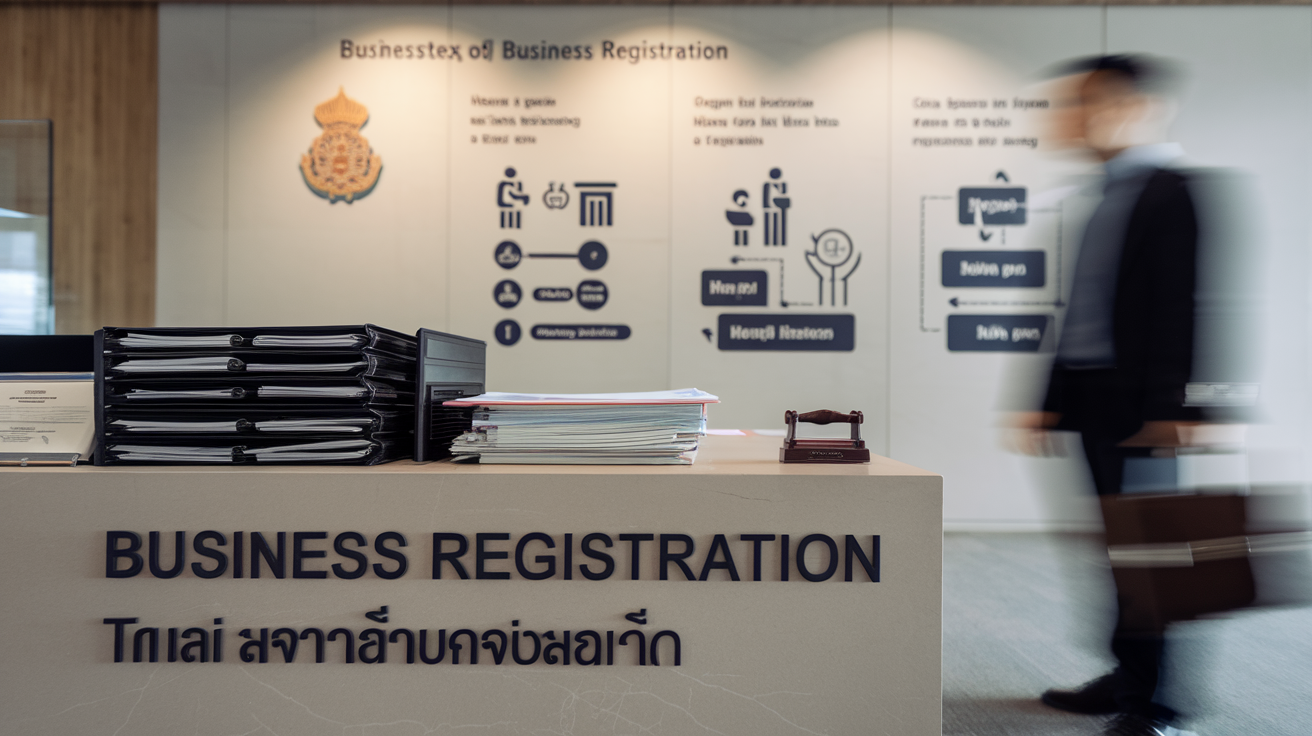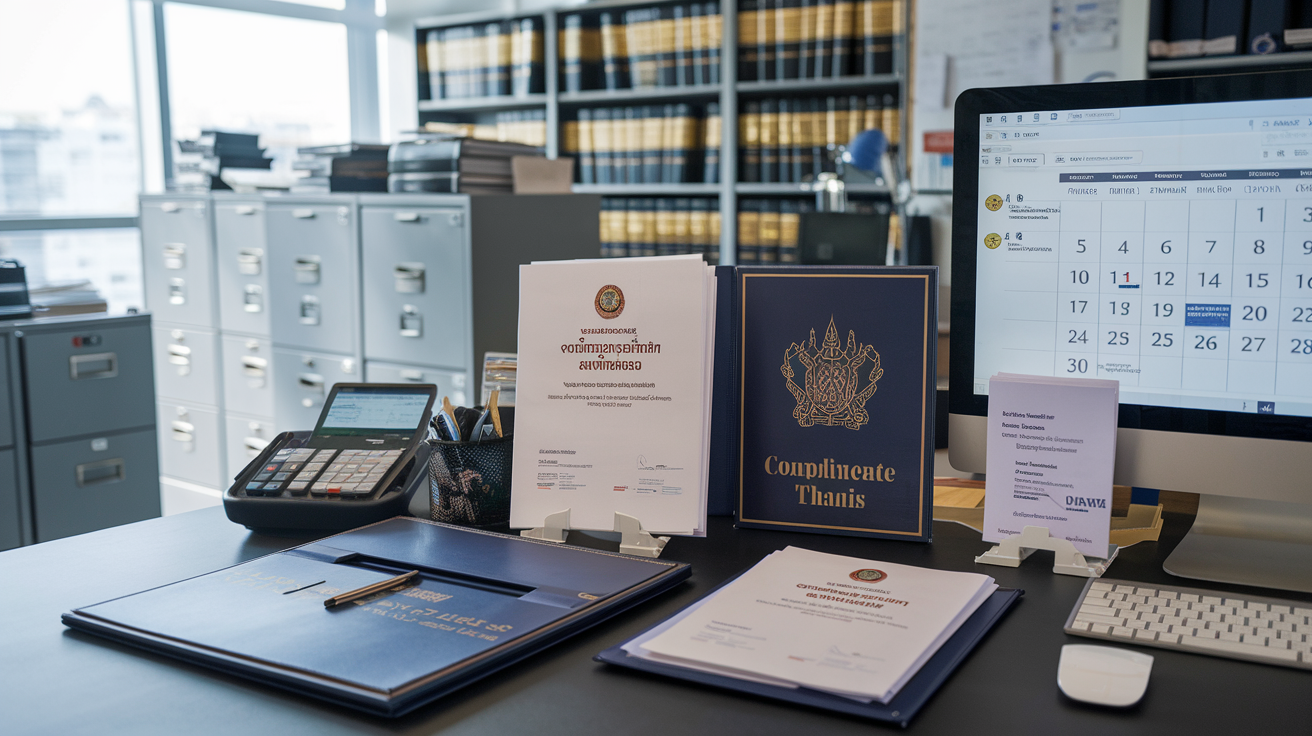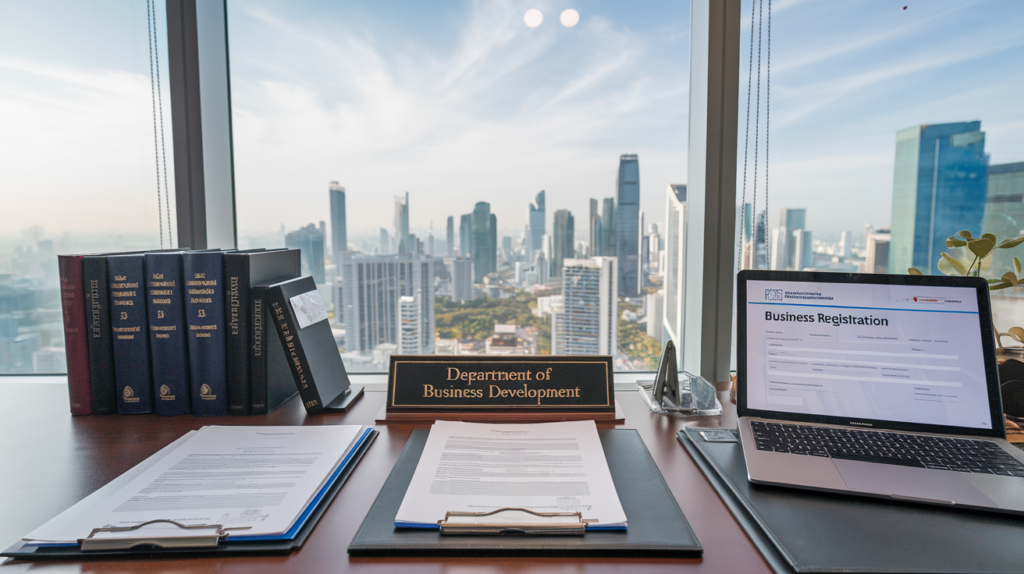Are you ready to unlock the potential of Thailand’s thriving business landscape? 🇹🇭💼 Whether you’re a budding entrepreneur or an established company looking to expand, understanding the ins and outs of business registration in Thailand is crucial for your success.
Imagine setting up shop in the bustling streets of Bangkok or the serene beaches of Phuket, only to face legal hurdles and missed opportunities due to improper registration. Don’t let your dreams of Thai business success turn into a bureaucratic nightmare! From reaping the benefits of proper registration to avoiding severe consequences of non-compliance, this guide will walk you through everything you need to know.
In the following sections, we’ll delve into the importance of business registration in Thailand, explore the advantages it brings, and outline the step-by-step process to get your venture officially recognized. We’ll also navigate the cultural and legal nuances unique to Thailand and discuss essential post-registration compliance. So, let’s embark on this journey to transform your Thai business aspirations into a legally sound and prosperous reality! 🚀📊
Understanding Business Registration in Thailand

A. Definition and legal requirements
Business registration in Thailand is a legal process that officially recognizes and authorizes a company to operate within the country. It involves registering your business with the appropriate government agencies, obtaining necessary licenses, and complying with Thai laws and regulations. The legal requirements vary depending on the type of business entity chosen and the nature of the business activities.
Key legal requirements include:
- Minimum registered capital
- Shareholder structure
- Work permits for foreign employees
- Tax registration
- Business licenses specific to your industry
B. Types of business entities available
Thailand offers several business entity options for entrepreneurs and investors. The most common types include:
| Entity Type | Description | Suitable For |
|---|---|---|
| Limited Company | Limited liability, separate legal entity | Most businesses |
| Branch Office | Extension of foreign company | Foreign companies |
| Representative Office | Non-income generating office | Market research, coordination |
| Partnership | General or limited partnership | Small businesses, professionals |
C. Key government agencies involved
Several government agencies play crucial roles in the business registration process:
- Department of Business Development (DBD): Handles company registration and corporate matters
- Revenue Department: Manages tax registration and compliance
- Ministry of Commerce: Oversees foreign business licenses and regulations
- Board of Investment (BOI): Provides investment incentives and promotions
- Immigration Bureau: Handles work permits and visas for foreign employees
Understanding these agencies and their roles is essential for a smooth registration process. Each agency has specific requirements and procedures that businesses must follow to ensure compliance with Thai laws and regulations.
Benefits of Proper Business Registration

Legal protection and credibility
Registering your business in Thailand provides a robust legal shield and enhances your company’s credibility. By operating within the legal framework, you safeguard your business interests and personal assets. This protection is crucial in case of disputes or legal challenges.
| Aspect | Registered Business | Unregistered Business |
|---|---|---|
| Legal Status | Recognized entity | No legal recognition |
| Asset Protection | Limited liability | Personal liability |
| Dispute Resolution | Access to legal system | Limited recourse |
Access to government incentives
The Thai government offers various incentives to registered businesses, promoting economic growth and foreign investment. These benefits can significantly boost your business operations and profitability.
- Tax breaks and exemptions
- Grants for specific industries
- Support for research and development
- Preferential treatment in government contracts
Easier financial transactions and banking
Proper registration facilitates smoother financial operations and banking relationships. Banks and financial institutions are more willing to work with registered businesses, offering better services and terms.
Attracting investors and partners
A registered business in Thailand presents a more attractive proposition to potential investors and partners. It demonstrates commitment, stability, and compliance with local regulations, which are crucial factors for building trust and securing collaborations.
Now that we’ve explored the benefits of proper business registration, let’s examine the potential consequences of operating without registration in Thailand.
Consequences of Operating Without Registration

Legal risks and penalties
Operating a business without proper registration in Thailand exposes entrepreneurs to significant legal risks and penalties. The Thai government takes unregistered businesses seriously, imposing hefty fines and potential imprisonment for non-compliance. Here’s a breakdown of the potential consequences:
| Consequence | Description |
|---|---|
| Fines | Up to 200,000 THB for operating without a license |
| Imprisonment | Maximum of 2 years for severe cases |
| Daily penalties | Additional fines for each day of continued operation |
| Business closure | Authorities may forcibly shut down unregistered businesses |
Limited business opportunities
Unregistered businesses face numerous limitations that can stifle growth and success:
- Inability to open corporate bank accounts
- Restricted access to government contracts and tenders
- Difficulty in attracting investors or securing loans
- Limited ability to hire foreign employees
- Challenges in establishing partnerships with registered companies
These limitations can significantly hamper a business’s potential for expansion and profitability in the Thai market.
Difficulty in dispute resolution
Without proper registration, businesses face considerable challenges in resolving disputes:
- Limited legal standing in courts
- Inability to enforce contracts effectively
- Difficulty in protecting intellectual property rights
- Lack of access to formal dispute resolution mechanisms
- Increased vulnerability to fraud and scams
These factors can leave unregistered businesses exposed to significant risks and without proper recourse in case of conflicts or legal issues.
Steps to Register a Business in Thailand

Choosing the right business structure
When registering a business in Thailand, selecting the appropriate structure is crucial. The most common types include:
- Sole Proprietorship
- Partnership (Ordinary or Limited)
- Limited Company (Private or Public)
- Branch Office
- Representative Office
Each structure has its own advantages and limitations. Consider factors such as liability, taxation, and ownership restrictions when making your decision.
| Business Structure | Liability | Foreign Ownership | Taxation |
|---|---|---|---|
| Sole Proprietorship | Unlimited | Not allowed | Personal income tax |
| Partnership | Varies | Limited | Corporate income tax |
| Limited Company | Limited to investment | Up to 49% | Corporate income tax |
| Branch Office | Parent company liable | 100% allowed | Corporate income tax |
| Representative Office | Parent company liable | 100% allowed | No commercial activities |
Name reservation process
Once you’ve chosen a structure, the next step is reserving your business name. This process involves:
- Checking name availability
- Submitting a name reservation application
- Waiting for approval (usually 3-5 business days)
- Receiving a name reservation certificate
Document preparation and submission
After securing your business name, you’ll need to prepare and submit various documents, including:
- Articles of Association
- Memorandum of Association
- List of shareholders and directors
- Company registration forms
- Thai ID cards or passports of all involved parties
These documents must be submitted to the Department of Business Development (DBD) along with the required fees.
Obtaining necessary licenses and permits
Finally, depending on your business type, you may need to acquire specific licenses and permits. Common requirements include:
- VAT registration (if annual turnover exceeds 1.8 million baht)
- Social Security Fund registration
- Workmen’s Compensation Fund registration
- Factory license (for manufacturing businesses)
- Foreign Business License (if applicable)
Ensure you research and obtain all necessary permits to operate legally in Thailand. With these steps completed, you’ll be ready to start your business operations in compliance with Thai regulations.
Navigating Cultural and Legal Nuances

Understanding Thai business etiquette
When conducting business in Thailand, understanding and respecting local customs is crucial for success. Thai business culture emphasizes harmony, respect, and indirect communication. Here are some key aspects to keep in mind:
- Greeting: Use the traditional Thai greeting “wai” (pressing palms together at chest level with a slight bow)
- Hierarchy: Respect age and position in business interactions
- Communication: Avoid confrontation and use subtle, indirect language
- Dress code: Conservative business attire is expected
| Dos | Don’ts |
|---|---|
| Be patient and polite | Rush decisions or show frustration |
| Use formal titles (Khun) | Touch someone’s head |
| Respect the Thai monarchy | Engage in public displays of affection |
| Remove shoes when entering homes or temples | Point with your feet |
Foreign ownership restrictions
Thailand has specific regulations regarding foreign ownership of businesses to protect local industries. Key points include:
- Foreign Business Act: Limits foreign ownership in certain sectors
- 49% rule: Many businesses are restricted to 49% foreign ownership
- BOI promotion: Possible exemptions for promoted industries
Work permit and visa considerations
Foreigners working in Thailand must obtain proper documentation:
- Non-Immigrant B Visa: Required for employment
- Work Permit: Mandatory for legal employment
- 90-day reporting: Regular check-ins with immigration
Navigating these cultural and legal nuances is essential for establishing a successful business presence in Thailand. Next, we’ll explore the ongoing responsibilities that come after successfully registering your business.
Post-Registration Compliance

Annual financial reporting requirements
Thai businesses must adhere to strict financial reporting standards. Here’s a breakdown of the key requirements:
- Annual financial statements
- Auditor’s report
- List of shareholders
- Minutes of annual general meeting
These documents must be submitted to the Department of Business Development within one month after the annual general meeting.
| Document | Deadline | Submitted to |
|---|---|---|
| Financial statements | 1 month after AGM | Department of Business Development |
| Auditor’s report | 1 month after AGM | Department of Business Development |
| Shareholder list | 1 month after AGM | Department of Business Development |
| AGM minutes | 1 month after AGM | Department of Business Development |
Tax obligations and deadlines
Businesses in Thailand must meet various tax obligations:
- Corporate Income Tax (CIT): Filed annually
- Value Added Tax (VAT): Monthly or quarterly filing
- Withholding Tax: Depends on transaction type
- Social Security contributions: Monthly filing
It’s crucial to maintain accurate records and meet all deadlines to avoid penalties.
Updating business information
Keeping your business information current is essential. This includes:
- Changes in company directors
- Alterations to registered capital
- Updates to business address or contact details
These changes must be reported to the Department of Business Development within 14 days. Regular compliance checks and updates ensure your business remains in good standing with Thai authorities.

Registering a business in Thailand is a crucial step for entrepreneurs looking to establish a legitimate and successful venture in this dynamic Southeast Asian market. From understanding the registration process to reaping the benefits of compliance, proper business registration sets the foundation for long-term success and growth. By following the necessary steps and navigating cultural and legal nuances, businesses can position themselves for success while avoiding potential penalties and legal issues.
As you embark on your entrepreneurial journey in Thailand, remember that business registration is not just a legal requirement but an investment in your company’s future. By ensuring proper registration and maintaining post-registration compliance, you’ll gain credibility, access to resources, and the peace of mind to focus on growing your business in this vibrant and promising market. Take the first step towards your Thai business success by prioritizing proper registration and compliance.

